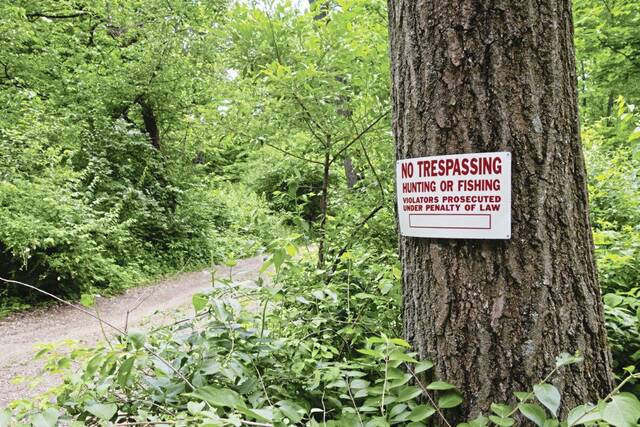Hunter Jon Mikesell and his friends thought they were alone when they reserved a clubhouse on private land in rural Pennsylvania for a Fourth of July retreat. But somebody was watching them the whole time.
A man dressed in camouflage tracked the group’s activities from a hidden spot in the distance, using binoculars to get a better view. The secret observer knew he was on private property belonging to the Pitch Pine Hunting Club because the parcel — about two square miles in Clearfield County northeast of Pittsburgh — had purple boundary markers and “no trespassing” signs around the perimeter, and closed gates at all entrances.
After multiple days in hiding, the man revealed his presence by climbing into his truck and driving toward the clubhouse. The targets of his surveillance were sitting on the front porch at the time, watching deer and birds eat seeds that Mikesell had spread on the ground to entertain his guests — city dwellers not used to seeing wildlife.
Mikesell’s friends and family felt alarmed when they saw the vehicle approaching, and their unease increased when the stranger introduced himself as a Pennsylvania Game Commission officer.
Understandably, the group had questions. Was the officer investigating a crime? Did he have a warrant? Did he have permission from club owners to enter private land? Was he responding to some kind of emergency? The answers were no, no, no and no.
The officer simply wanted to make sure that no one in the group was violating any hunting rules. Finding nothing wrong, he left without issuing a citation.
In the years following the 2013 encounter, the same officer has returned on several occasions without ever catching any Pitch Pine club member violating any hunting law. Similar intrusions at the neighboring Punxsutawney Hunting Club have produced a few minor citations, but nothing that would justify special government attention.
Rather than put up with the warrantless entries, which have become standard practice for the Pennsylvania Game Commission, both clubs teamed up and sued the state on Dec. 16, 2021. Our public interest law firm, the Institute for Justice, represents them.
The plaintiffs do not seek cash. They just want officers to follow the Pennsylvania Constitution, which guarantees the right of the people to be “secure in their … possessions from unreasonable searches.”
Unfortunately, state lawmakers failed to consider that promise before inventing new police powers in 1986, allowing Pennsylvania Game Commission officers to go anywhere unannounced except inside private buildings and the immediate vicinity. Officers cannot sneak into bedrooms or peer through windows, but they can enter private land without a warrant or consent.
Game wardens love the latitude. Civil rights make law enforcement difficult, and crimefighters often complain about the rules of engagement. Individual liberty is important, they acknowledge, but so is public safety. If nothing else, they see room for compromise.
What they fail to understand is that Benjamin Franklin and his contemporaries also saw the need for compromise more than 200 years ago. Their answer was the state Constitution, which empowers the police to catch bad guys without infringing on the rights of everyone else. Giving the government any extra power destroys the balance.
The U.S. Supreme Court missed the implications in 1924 during Prohibition, when it sanctioned warrantless searches of private land to catch bootleggers brewing alcohol. The result was the “Open Fields Doctrine,” an affront to the Fourth Amendment that gained new life during the War on Drugs.
Despite expanding police power, several states have pushed back against the doctrine. Mississippi, Montana, New York, Oregon, Vermont and Washington all require officers to get a warrant or consent — or show some kind of emergency — before ignoring a “no trespassing” sign.
Officers still have tools to fight hunting violations and other types of crimes in these jurisdictions. But they must do so within the constraints of their state constitutions, which often include language that mirrors or expands upon the Fourth Amendment.
Pennsylvania had a chance to join the list in 2007, when a landowner challenged a warrantless search on his property. The Pennsylvania Supreme Court took the case, but decided that the state Constitution does not protect private land.
Like a hunter who shoots and misses, Pennsylvania must reload and take aim again. Fortunately, the Pitch Pine and Punxsutawney clubs have provided one more chance to hit the target.
Joshua Windham is an attorney and Daryl James is a writer at the Institute for Justice in Arlington, Va.








